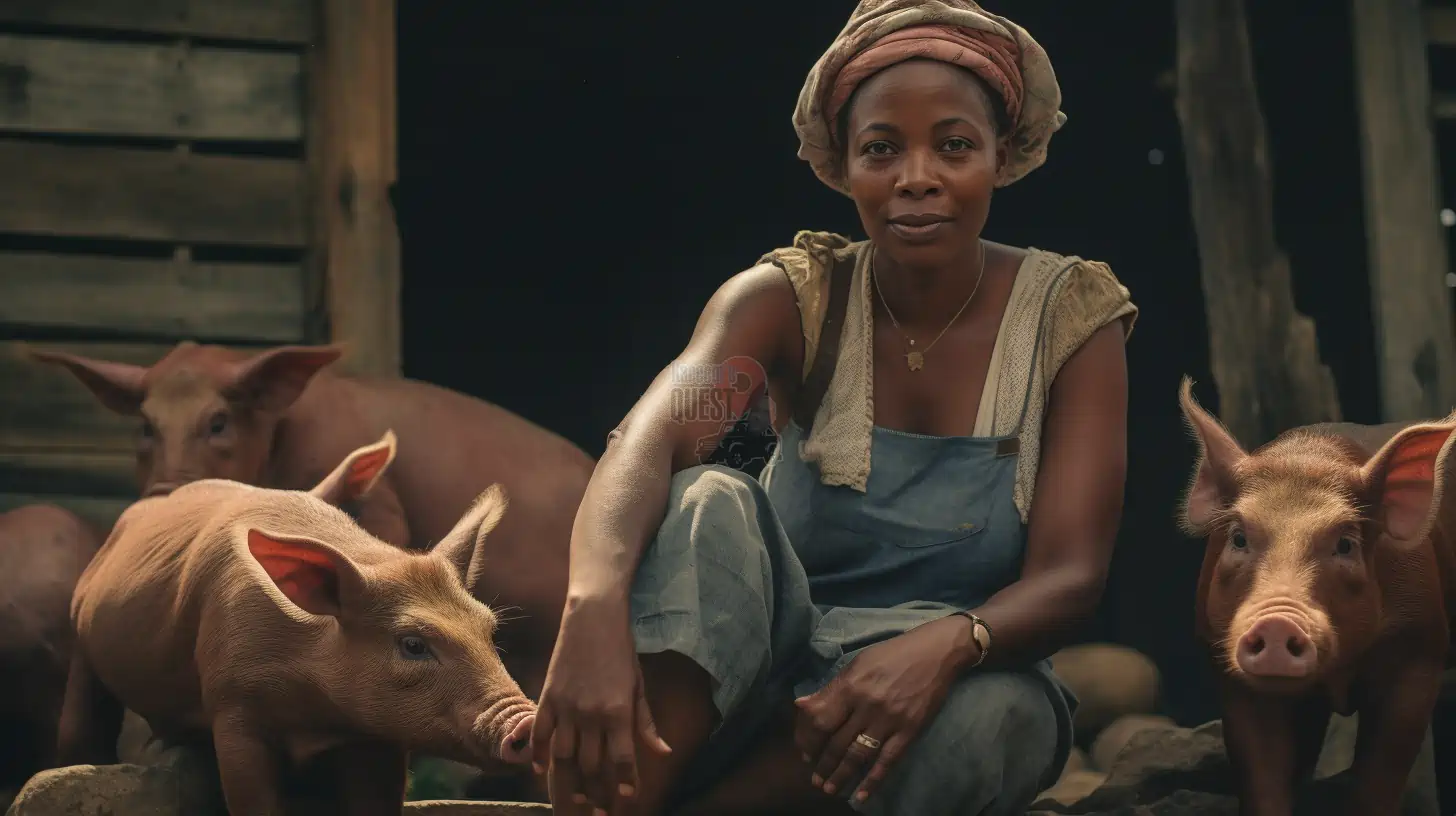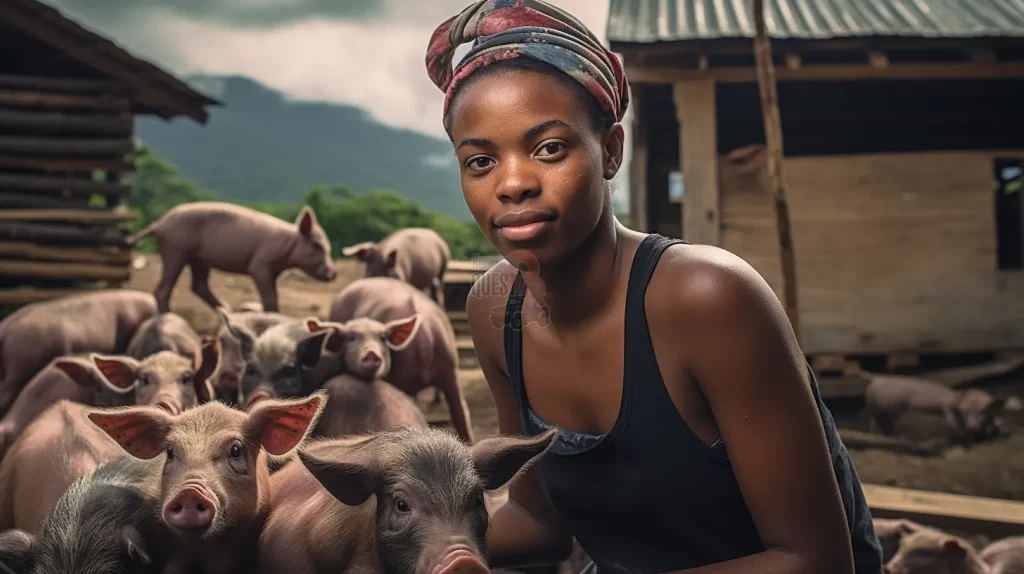The Journey Begins: A Slow but Steady Payoff
Marsha Graham’s venture into pig farming started with determination and a clear vision. With the addition of ten newborn piglets and a sow, her foray into pig rearing began to show promise. Alongside the nine weanlings, three breeding sows, a boar, and a shoat, Graham was committed to expanding her herd steadily. From an interview done with The Gleaner, she disclosed, “It takes a lot of work but, in the long run, it can pay off, but you have to spend a lot of time.”
Embracing the Challenges: Dedication in the Face of Adversity
As a pig farmer in Somerset, St. Thomas, Marsha Graham invests a significant amount of time and effort to ensure the well-being of her animals. Daily tasks include feeding, maintaining clean pens, and monitoring the health of the pigs. The rising cost of feed is an ongoing concern, but Graham remains undeterred in her pursuit of success. Her dedication to overcoming challenges sets a prime example for aspiring pig farmers looking to make their mark in the industry.
The Youth and Agriculture: Bridging the Gap
Marsha Graham highlights a concerning trend in modern times – the reluctance of many young people to engage in agricultural work.
Video of the Week
“A lot of them, if you ask them to come and help you, they tell you them can’t bother with that, but still them want a money from you,” she remarked in her interview. While the financial rewards of pig farming can be significant, Graham acknowledges the importance of investing time and effort to achieve success.
A Helping Hand: The European Union/Christian AID’s Support
Her success story is intertwined with the support she received from the European Union/Christian AID’s Strengthening Capacities for Sustainable Livelihoods project. With the aid of this initiative, Graham was provided with two sows to kickstart her pig farming venture in 2009.
The Road Ahead: Sustainable Farming for Economic Independence
As Marsha Graham’s journey in pig farming continues, she remains grateful for the opportunities it has provided her with. Her dedication and hard work have laid the foundation for a successful pig farming business, with the potential to achieve economic independence. KareemsQuest.com, encourages aspiring pig farmers to follow in Graham’s footsteps, embracing sustainable farming practices and building a brighter future for themselves and their communities.
Common questions about pig farming:

- What are the organizations that support Pig Farming in Jamaica?
- The Jamaica Pig Farmers Association (JPFA) is a non-profit organization that provides training, technical assistance, and marketing support to pig farmers in Jamaica. The JPFA also has a website with a wealth of information on pig farming, including articles, videos, and a forum where you can ask questions and get advice from other pig farmers.
- The Ministry of Industry, Commerce, Agriculture and Fisheries (MICAF) has a department that is responsible for livestock production. The MICAF can provide you with information on pig farming regulations, as well as access to government-funded programs that can help you start or expand your pig farming operation.
- The University of the West Indies (UWI) has a Faculty of Agriculture and Food Science that offers courses on pig farming. The UWI also has a research station that studies pig production, and you can contact the station for information on the latest research findings.
- The Jamaica Agricultural Society (JAS) is a non-profit organization that provides support to farmers in Jamaica. The JAS can help you find a mentor who is experienced in pig farming, and they can also connect you with other farmers who are interested in pig production.
- What are the best pig breeds for farming in Jamaica?
– Some popular pig breeds suitable for farming in Jamaica are Duroc, Hampshire, and Landrace. These breeds are known for their good growth rates, meat quality, and adaptability to the Jamaican climate.
- What are the challenges faced by pig farmers in Jamaica?
– Pig farmers in Jamaica often face challenges such as rising feed costs, disease management, market fluctuations, and accessing financial support. Managing these challenges requires careful planning and staying up-to-date with industry best practices.
- How to prevent and manage pig diseases in Jamaica?
– Preventing and managing pig diseases involves maintaining proper hygiene and sanitation, regular health checks, vaccinations, and quick isolation of sick animals. Consulting with veterinarians and agricultural extension officers is crucial for disease prevention and control.
- How can I improve the growth rate of pigs on my farm in Jamaica?
– Improving the growth rate of pigs involves providing a balanced and nutritious diet, ensuring clean and spacious pens, and promoting a stress-free environment. Using quality pig feeds and practicing proper herd management techniques can also contribute to better growth rates.
- What are the best practices for pig farming in Jamaica?
– The best practices for pig farming in Jamaica include proper nutrition, maintaining good hygiene, regular health monitoring, proper waste management, and following biosecurity measures. Adhering to these practices helps ensure the health and productivity of the pig herd.
- How to start a pig farming business in Jamaica?
– Starting a pig farming business in Jamaica requires proper planning, acquiring suitable land, sourcing quality pig breeds, and ensuring proper housing and feeding facilities for the pigs. It’s essential to research local regulations and seek advice from experienced farmers or agricultural organizations.
- How can I market my pig products in Jamaica?
– Marketing pig products in Jamaica can be done through local markets, direct sales to consumers, or supplying to supermarkets and restaurants. Networking with potential buyers, promoting the quality of your products, and ensuring consistent supply can help attract customers.
- What is the typical breeding cycle for pigs in Jamaica?
– The breeding cycle for pigs typically lasts around 114 days (3 months, 3 weeks, and 3 days). After this period, sows give birth to a litter of piglets, and farmers can plan their breeding schedule accordingly.
- Is pig farming a profitable venture in Jamaica?
– Pig farming can be a profitable venture in Jamaica if managed well. With proper planning, efficient management practices, and a steady market for pig products, farmers can achieve economic success in this sector. However, like any business, it requires dedication and hard work to be profitable.



